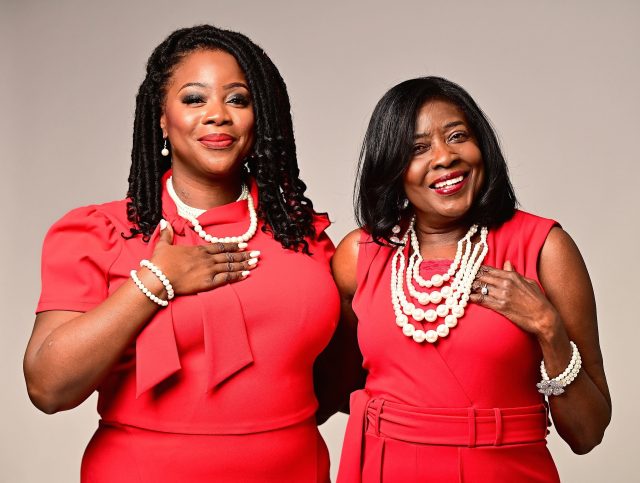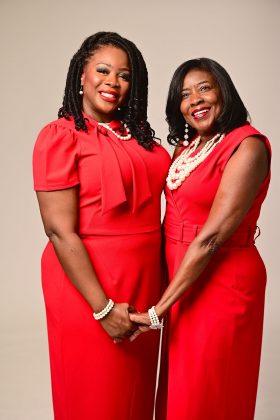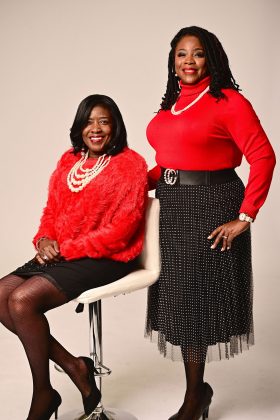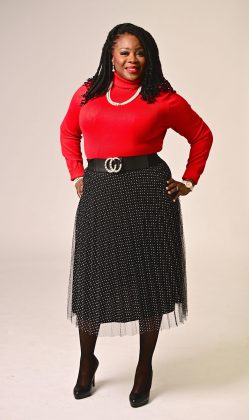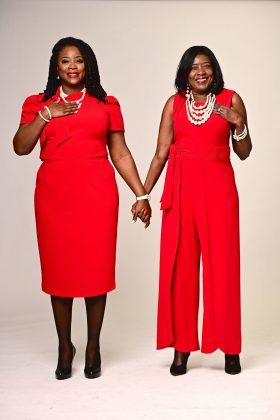By Barnett Wright
The Birmingham Times
“Like mother, like daughter” is more than a proverb for Lucy Emonina and Ovuke’ Emonina McCoy, both of whom had strokes and received heart transplants decades apart.
Mother (Emonina) and daughter (McCoy) were born with a genetic condition called hypertrophic cardiomyopathy, a thickening of the walls of heart that makes it difficult for the heart to pump blood. The illness runs in their family: Emonina lost four brothers and two sons, McCoy’s siblings, to the disease.
“When you say, ‘I want to grow up and be like my mom,’ you don’t think, ‘I want to be like my mom and have a heart transplant,’” said McCoy. “That’s what happened, [though]—my mom had a heart transplant, and I had a heart transplant.”
Both are doing well now and are passionate about raising awareness about women’s health as Mother’s Day approaches.
When Emonina was 42 years old, she got the news that she needed a new heart. Family members urged her to reconsider, but “I wanted to be here for my children and see them grow up,” she said, noting that her youngest wasn’t even 4 years old at the time. “I was ready for it.”
Fast forward two decades.
When McCoy was around the same age, 43, and had been married for just three weeks, she was told that she would need a transplant.
“Instead of focusing on being ready to celebrate my marriage and being on my honeymoon, I was waiting on a heart transplant and thinking, ‘Am I going to live and be part of a marriage?’” said McCoy, who married her husband, Marvin, on New Year’s Eve in 2017.
Mother-Daughter Journey
As a mom, Emonina provided encouragement for McCoy, now her only child after having lost her two sons to heart disease.
“I don’t want her to give up because we have been through so much,” said Emonina. “I have to remain strong. I always try to say encouraging things to her. If she seems like she is down, I’m always trying to lift her spirits.”
McCoy said doesn’t know where she would be without her mother.
“Seeing my mom going through these different types of health challenges has helped me because I have been able to ask her [about them],” said McCoy. “She has definitely served as my mentor, especially when I went through my heart transplant surgery, which has been the biggest [challenge] I’ve faced in my lifetime.”
Emonina received a transplant in 1995, and two decades later her daughter received one.
“She helped me through the process,” McCoy said. “She never, never in a million years would have thought that … two decades apart or literally at the same age we would have our heart transplants. I’m almost three years in, … and the heart transplant has been a journey and continues to be a journey. … I continue to improve because there are different things and next steps I go through every year.”
McCoy gets emotional when she talks about what her mom has meant to her.
“I don’t have any children,” she said. “I watched my brothers go through this. My 33-year-old brother passed in 2011. He was waiting on a heart transplant but, unfortunately, didn’t make it. Then my younger brother passed in 2019. He succumbed to heart disease and didn’t make it to the heart transplant list.
“My mom lost two sons due to this heart disease, and now she has me to celebrate Mother’s Day. … My brothers and I would call each other and try to do things for my mother, but now it’s just me doing things for my mom. … We’re closer now.”
Health Ambassadors
The mother and daughter are Alabama natives and current residents. Emonina, originally from Tuscaloosa, lives in Calera, and McCoy lives in Bessemer—and they are the first mother-daughter Go Red ambassadors for the American Heart Association. Heart disease is the number-one killer of Americans, and African Americans between the ages of 18 and 49 are twice as likely to die from it than whites.
Emonina and McCoy also speak about other health issues, such as stroke, which “occurs when a blood vessel that carries oxygen and nutrients to the brain is either blocked by a clot or bursts (or ruptures). When that happens, part of the brain cannot get the blood (and oxygen) it needs, so it and brain cells die,” according to the American Stroke Association.
May is National Stroke Awareness Month, a time dedicated to calling attention to an illness that is the third leading cause of death among African American women, who are more likely to die from a stroke than non-Hispanic white women or Hispanics in the United States.
African Americans have the highest rate of death due to stroke, which can also be caused by another common genetic disorder among African Americans: sickle cell disease. The Sickle Cell Disease Association of America Inc. describes sickle cell disease as “an inherited blood disorder that affects red blood cells,” sometimes causing them to become sickle (or crescent) shaped and making it difficult for them to pass through small blood vessels. About 1 in 365 African American babies is born with sickle cell disease.
Helping Others
In the summer of 2017, McCoy experienced a ministroke, or transient ischemic attack (TIA), “a temporary period of symptoms similar to those of a stroke, … which can “serve as both a warning of a future stroke and an opportunity to prevent it,” according to the Mayo Clinic. During the episode, McCoy was unable to speak, noticed numbness in her extremities, and experienced blurred vision.
“Those are signs people need to be aware of,” she said, explaining that she went to the hospital and received “medication therapy” after the ministroke.
Emonina also experienced TIA in 1993, two years before undergoing her heart transplant.
“My left side was limp, my vision was blurred, I could not speak, … all I could do was wave my hand. … I was at work, and all day I had been feeling really bad and fatigued. … I said, ‘When I get home, I’ll lay down.’ When I laid down, that’s when I noticed I couldn’t lift my arm and [was unable to speak],” she recalled, adding that she was in the hospital for a week following that incident.
Today, Emonina is focused on staying healthy. “I take my medication and eat right, [though] I don’t [always] exercise like I’m supposed to. [Still], I haven’t had any problems since [my heart transplant].”
She also is focused on teaming up with her daughter to help others overcome heart and other health issues.
Because of the challenges they’ve endured together, Emonina, who is retired, and McCoy, who recently began her first full-time job after two years, have dedicated themselves to launching a nonprofit, The Heart of Emonina Inc., in early fall 2021. The organization, in memory of McCoy’s brothers and Emonina’s sons, will provide resources to families dealing with cardiac issues.
To find out more about The Heart of Emonina Inc., email ovukeriena@outlook.com.

